Business Issues in the Contemporary World
VerifiedAdded on 2023/01/09
|6
|1846
|21
AI Summary
Contribute Materials
Your contribution can guide someone’s learning journey. Share your
documents today.
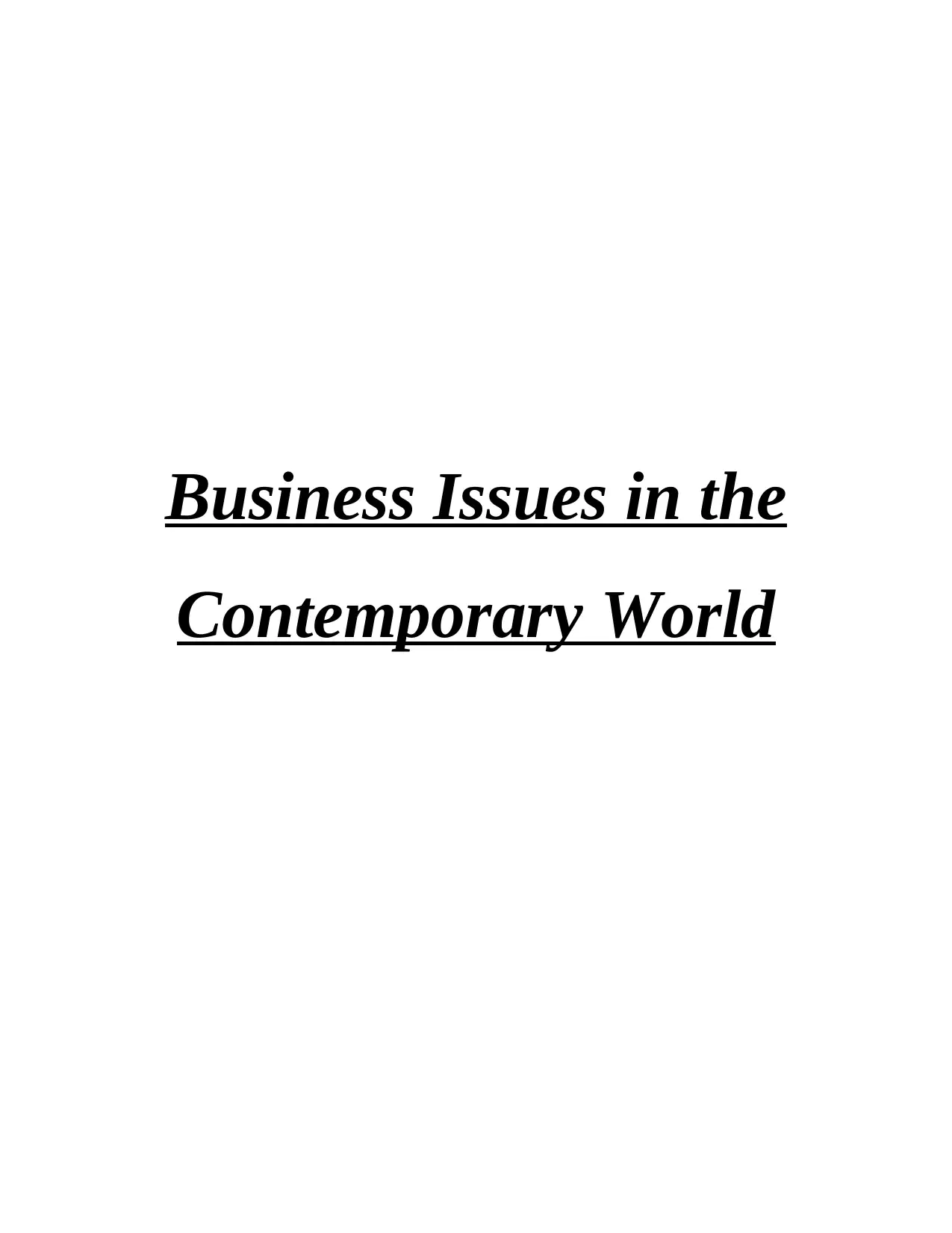
Business Issues in the
Contemporary World
Contemporary World
Secure Best Marks with AI Grader
Need help grading? Try our AI Grader for instant feedback on your assignments.
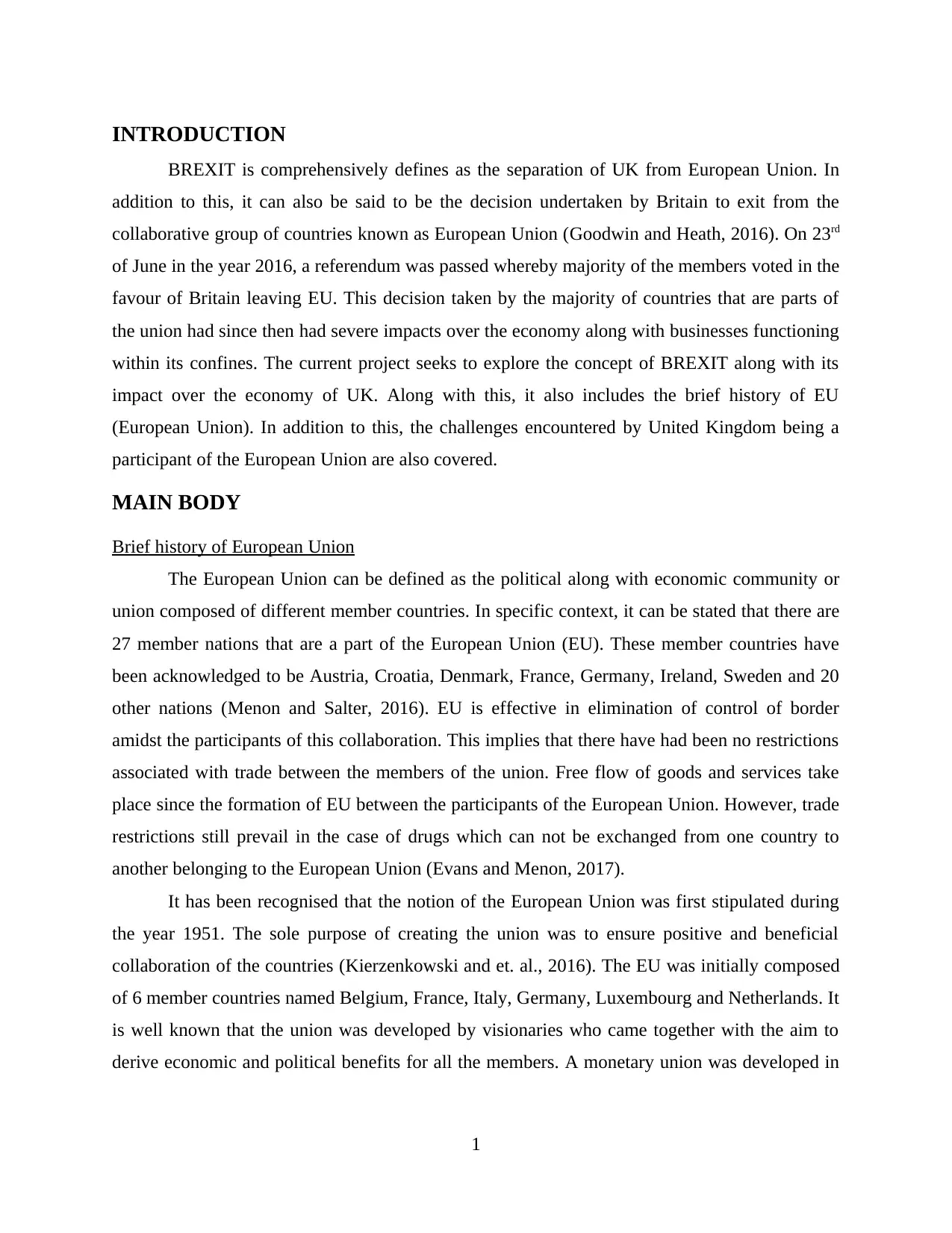
INTRODUCTION
BREXIT is comprehensively defines as the separation of UK from European Union. In
addition to this, it can also be said to be the decision undertaken by Britain to exit from the
collaborative group of countries known as European Union (Goodwin and Heath, 2016). On 23rd
of June in the year 2016, a referendum was passed whereby majority of the members voted in the
favour of Britain leaving EU. This decision taken by the majority of countries that are parts of
the union had since then had severe impacts over the economy along with businesses functioning
within its confines. The current project seeks to explore the concept of BREXIT along with its
impact over the economy of UK. Along with this, it also includes the brief history of EU
(European Union). In addition to this, the challenges encountered by United Kingdom being a
participant of the European Union are also covered.
MAIN BODY
Brief history of European Union
The European Union can be defined as the political along with economic community or
union composed of different member countries. In specific context, it can be stated that there are
27 member nations that are a part of the European Union (EU). These member countries have
been acknowledged to be Austria, Croatia, Denmark, France, Germany, Ireland, Sweden and 20
other nations (Menon and Salter, 2016). EU is effective in elimination of control of border
amidst the participants of this collaboration. This implies that there have had been no restrictions
associated with trade between the members of the union. Free flow of goods and services take
place since the formation of EU between the participants of the European Union. However, trade
restrictions still prevail in the case of drugs which can not be exchanged from one country to
another belonging to the European Union (Evans and Menon, 2017).
It has been recognised that the notion of the European Union was first stipulated during
the year 1951. The sole purpose of creating the union was to ensure positive and beneficial
collaboration of the countries (Kierzenkowski and et. al., 2016). The EU was initially composed
of 6 member countries named Belgium, France, Italy, Germany, Luxembourg and Netherlands. It
is well known that the union was developed by visionaries who came together with the aim to
derive economic and political benefits for all the members. A monetary union was developed in
1
BREXIT is comprehensively defines as the separation of UK from European Union. In
addition to this, it can also be said to be the decision undertaken by Britain to exit from the
collaborative group of countries known as European Union (Goodwin and Heath, 2016). On 23rd
of June in the year 2016, a referendum was passed whereby majority of the members voted in the
favour of Britain leaving EU. This decision taken by the majority of countries that are parts of
the union had since then had severe impacts over the economy along with businesses functioning
within its confines. The current project seeks to explore the concept of BREXIT along with its
impact over the economy of UK. Along with this, it also includes the brief history of EU
(European Union). In addition to this, the challenges encountered by United Kingdom being a
participant of the European Union are also covered.
MAIN BODY
Brief history of European Union
The European Union can be defined as the political along with economic community or
union composed of different member countries. In specific context, it can be stated that there are
27 member nations that are a part of the European Union (EU). These member countries have
been acknowledged to be Austria, Croatia, Denmark, France, Germany, Ireland, Sweden and 20
other nations (Menon and Salter, 2016). EU is effective in elimination of control of border
amidst the participants of this collaboration. This implies that there have had been no restrictions
associated with trade between the members of the union. Free flow of goods and services take
place since the formation of EU between the participants of the European Union. However, trade
restrictions still prevail in the case of drugs which can not be exchanged from one country to
another belonging to the European Union (Evans and Menon, 2017).
It has been recognised that the notion of the European Union was first stipulated during
the year 1951. The sole purpose of creating the union was to ensure positive and beneficial
collaboration of the countries (Kierzenkowski and et. al., 2016). The EU was initially composed
of 6 member countries named Belgium, France, Italy, Germany, Luxembourg and Netherlands. It
is well known that the union was developed by visionaries who came together with the aim to
derive economic and political benefits for all the members. A monetary union was developed in
1
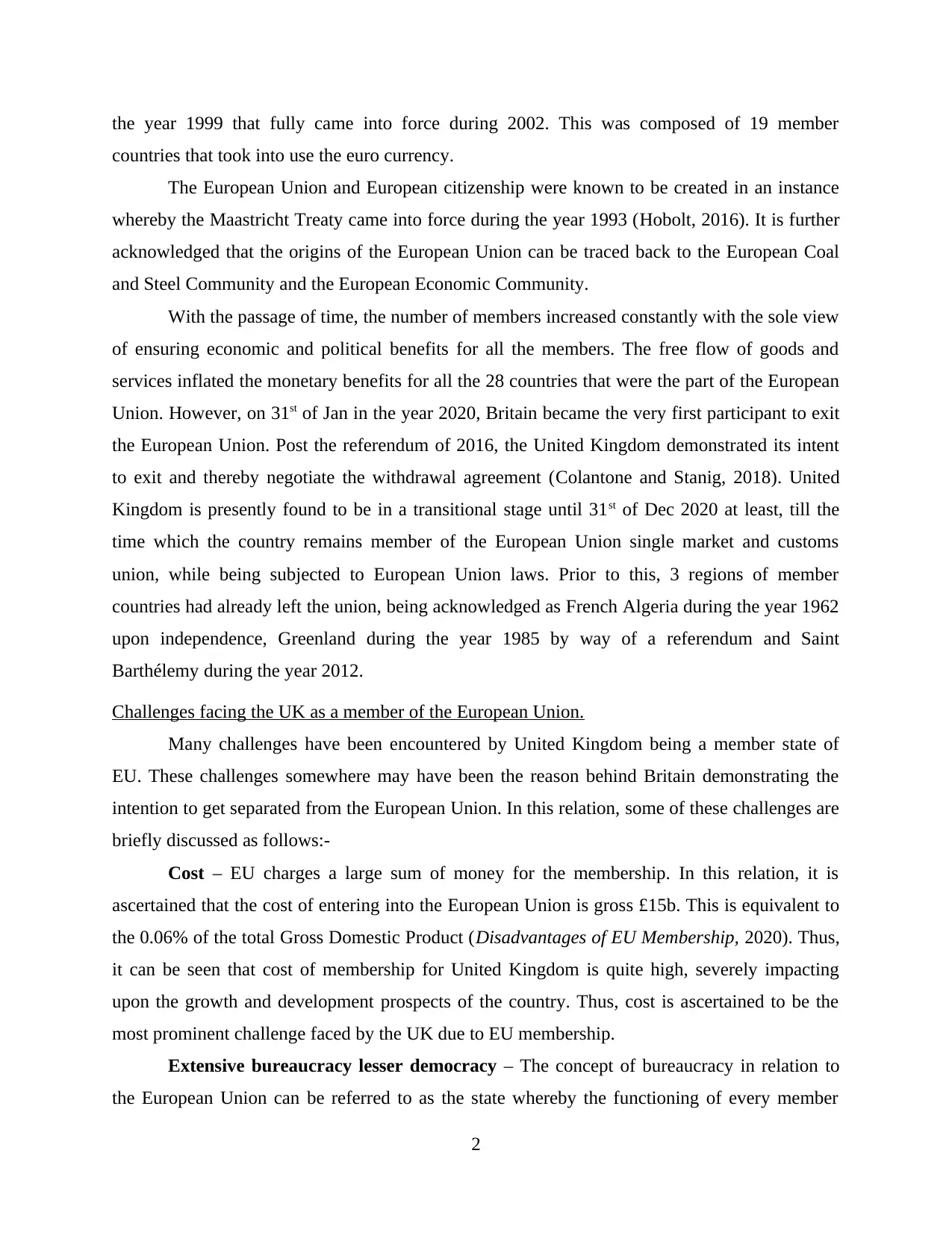
the year 1999 that fully came into force during 2002. This was composed of 19 member
countries that took into use the euro currency.
The European Union and European citizenship were known to be created in an instance
whereby the Maastricht Treaty came into force during the year 1993 (Hobolt, 2016). It is further
acknowledged that the origins of the European Union can be traced back to the European Coal
and Steel Community and the European Economic Community.
With the passage of time, the number of members increased constantly with the sole view
of ensuring economic and political benefits for all the members. The free flow of goods and
services inflated the monetary benefits for all the 28 countries that were the part of the European
Union. However, on 31st of Jan in the year 2020, Britain became the very first participant to exit
the European Union. Post the referendum of 2016, the United Kingdom demonstrated its intent
to exit and thereby negotiate the withdrawal agreement (Colantone and Stanig, 2018). United
Kingdom is presently found to be in a transitional stage until 31st of Dec 2020 at least, till the
time which the country remains member of the European Union single market and customs
union, while being subjected to European Union laws. Prior to this, 3 regions of member
countries had already left the union, being acknowledged as French Algeria during the year 1962
upon independence, Greenland during the year 1985 by way of a referendum and Saint
Barthélemy during the year 2012.
Challenges facing the UK as a member of the European Union.
Many challenges have been encountered by United Kingdom being a member state of
EU. These challenges somewhere may have been the reason behind Britain demonstrating the
intention to get separated from the European Union. In this relation, some of these challenges are
briefly discussed as follows:-
Cost – EU charges a large sum of money for the membership. In this relation, it is
ascertained that the cost of entering into the European Union is gross £15b. This is equivalent to
the 0.06% of the total Gross Domestic Product (Disadvantages of EU Membership, 2020). Thus,
it can be seen that cost of membership for United Kingdom is quite high, severely impacting
upon the growth and development prospects of the country. Thus, cost is ascertained to be the
most prominent challenge faced by the UK due to EU membership.
Extensive bureaucracy lesser democracy – The concept of bureaucracy in relation to
the European Union can be referred to as the state whereby the functioning of every member
2
countries that took into use the euro currency.
The European Union and European citizenship were known to be created in an instance
whereby the Maastricht Treaty came into force during the year 1993 (Hobolt, 2016). It is further
acknowledged that the origins of the European Union can be traced back to the European Coal
and Steel Community and the European Economic Community.
With the passage of time, the number of members increased constantly with the sole view
of ensuring economic and political benefits for all the members. The free flow of goods and
services inflated the monetary benefits for all the 28 countries that were the part of the European
Union. However, on 31st of Jan in the year 2020, Britain became the very first participant to exit
the European Union. Post the referendum of 2016, the United Kingdom demonstrated its intent
to exit and thereby negotiate the withdrawal agreement (Colantone and Stanig, 2018). United
Kingdom is presently found to be in a transitional stage until 31st of Dec 2020 at least, till the
time which the country remains member of the European Union single market and customs
union, while being subjected to European Union laws. Prior to this, 3 regions of member
countries had already left the union, being acknowledged as French Algeria during the year 1962
upon independence, Greenland during the year 1985 by way of a referendum and Saint
Barthélemy during the year 2012.
Challenges facing the UK as a member of the European Union.
Many challenges have been encountered by United Kingdom being a member state of
EU. These challenges somewhere may have been the reason behind Britain demonstrating the
intention to get separated from the European Union. In this relation, some of these challenges are
briefly discussed as follows:-
Cost – EU charges a large sum of money for the membership. In this relation, it is
ascertained that the cost of entering into the European Union is gross £15b. This is equivalent to
the 0.06% of the total Gross Domestic Product (Disadvantages of EU Membership, 2020). Thus,
it can be seen that cost of membership for United Kingdom is quite high, severely impacting
upon the growth and development prospects of the country. Thus, cost is ascertained to be the
most prominent challenge faced by the UK due to EU membership.
Extensive bureaucracy lesser democracy – The concept of bureaucracy in relation to
the European Union can be referred to as the state whereby the functioning of every member
2
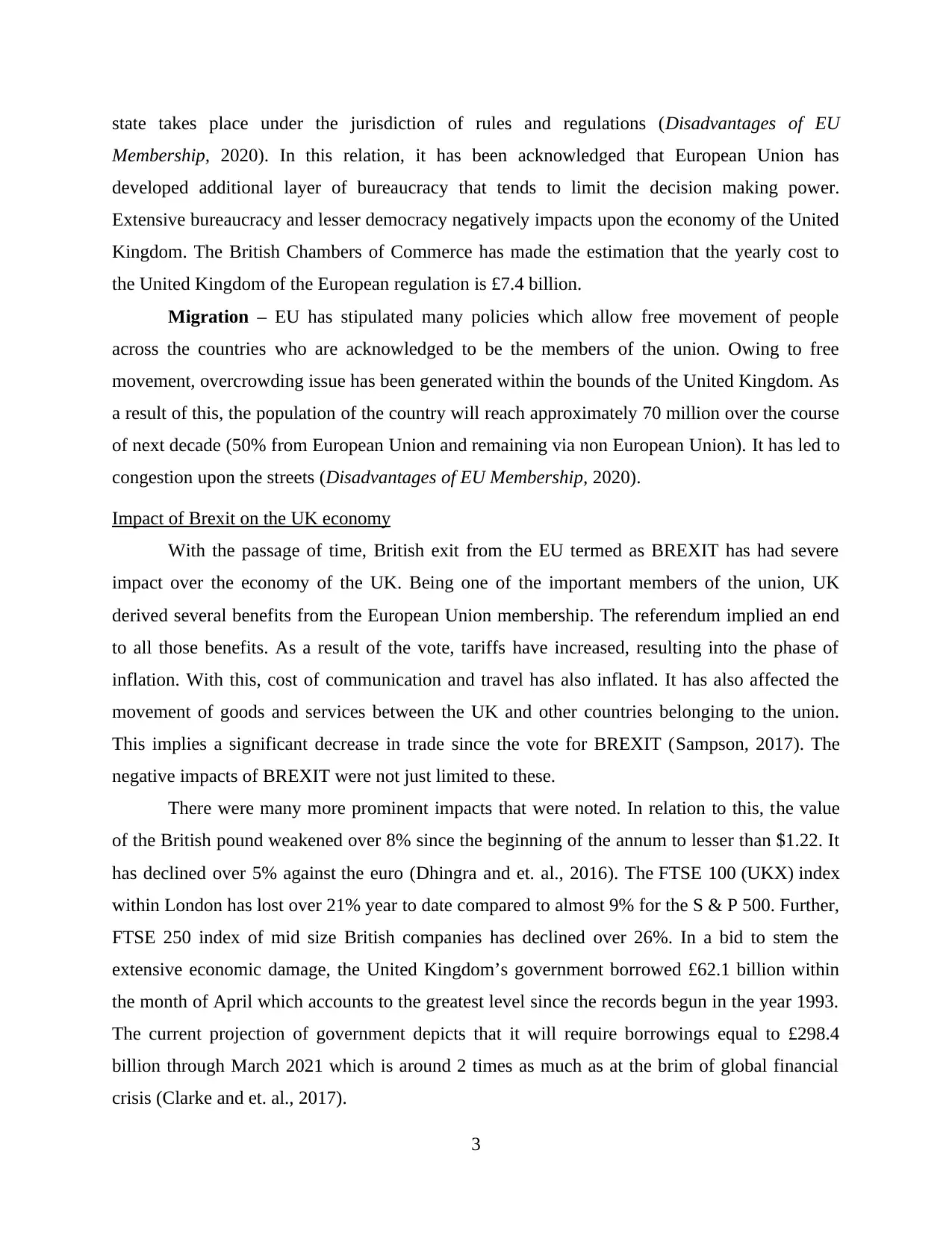
state takes place under the jurisdiction of rules and regulations (Disadvantages of EU
Membership, 2020). In this relation, it has been acknowledged that European Union has
developed additional layer of bureaucracy that tends to limit the decision making power.
Extensive bureaucracy and lesser democracy negatively impacts upon the economy of the United
Kingdom. The British Chambers of Commerce has made the estimation that the yearly cost to
the United Kingdom of the European regulation is £7.4 billion.
Migration – EU has stipulated many policies which allow free movement of people
across the countries who are acknowledged to be the members of the union. Owing to free
movement, overcrowding issue has been generated within the bounds of the United Kingdom. As
a result of this, the population of the country will reach approximately 70 million over the course
of next decade (50% from European Union and remaining via non European Union). It has led to
congestion upon the streets (Disadvantages of EU Membership, 2020).
Impact of Brexit on the UK economy
With the passage of time, British exit from the EU termed as BREXIT has had severe
impact over the economy of the UK. Being one of the important members of the union, UK
derived several benefits from the European Union membership. The referendum implied an end
to all those benefits. As a result of the vote, tariffs have increased, resulting into the phase of
inflation. With this, cost of communication and travel has also inflated. It has also affected the
movement of goods and services between the UK and other countries belonging to the union.
This implies a significant decrease in trade since the vote for BREXIT (Sampson, 2017). The
negative impacts of BREXIT were not just limited to these.
There were many more prominent impacts that were noted. In relation to this, the value
of the British pound weakened over 8% since the beginning of the annum to lesser than $1.22. It
has declined over 5% against the euro (Dhingra and et. al., 2016). The FTSE 100 (UKX) index
within London has lost over 21% year to date compared to almost 9% for the S & P 500. Further,
FTSE 250 index of mid size British companies has declined over 26%. In a bid to stem the
extensive economic damage, the United Kingdom’s government borrowed £62.1 billion within
the month of April which accounts to the greatest level since the records begun in the year 1993.
The current projection of government depicts that it will require borrowings equal to £298.4
billion through March 2021 which is around 2 times as much as at the brim of global financial
crisis (Clarke and et. al., 2017).
3
Membership, 2020). In this relation, it has been acknowledged that European Union has
developed additional layer of bureaucracy that tends to limit the decision making power.
Extensive bureaucracy and lesser democracy negatively impacts upon the economy of the United
Kingdom. The British Chambers of Commerce has made the estimation that the yearly cost to
the United Kingdom of the European regulation is £7.4 billion.
Migration – EU has stipulated many policies which allow free movement of people
across the countries who are acknowledged to be the members of the union. Owing to free
movement, overcrowding issue has been generated within the bounds of the United Kingdom. As
a result of this, the population of the country will reach approximately 70 million over the course
of next decade (50% from European Union and remaining via non European Union). It has led to
congestion upon the streets (Disadvantages of EU Membership, 2020).
Impact of Brexit on the UK economy
With the passage of time, British exit from the EU termed as BREXIT has had severe
impact over the economy of the UK. Being one of the important members of the union, UK
derived several benefits from the European Union membership. The referendum implied an end
to all those benefits. As a result of the vote, tariffs have increased, resulting into the phase of
inflation. With this, cost of communication and travel has also inflated. It has also affected the
movement of goods and services between the UK and other countries belonging to the union.
This implies a significant decrease in trade since the vote for BREXIT (Sampson, 2017). The
negative impacts of BREXIT were not just limited to these.
There were many more prominent impacts that were noted. In relation to this, the value
of the British pound weakened over 8% since the beginning of the annum to lesser than $1.22. It
has declined over 5% against the euro (Dhingra and et. al., 2016). The FTSE 100 (UKX) index
within London has lost over 21% year to date compared to almost 9% for the S & P 500. Further,
FTSE 250 index of mid size British companies has declined over 26%. In a bid to stem the
extensive economic damage, the United Kingdom’s government borrowed £62.1 billion within
the month of April which accounts to the greatest level since the records begun in the year 1993.
The current projection of government depicts that it will require borrowings equal to £298.4
billion through March 2021 which is around 2 times as much as at the brim of global financial
crisis (Clarke and et. al., 2017).
3
Secure Best Marks with AI Grader
Need help grading? Try our AI Grader for instant feedback on your assignments.
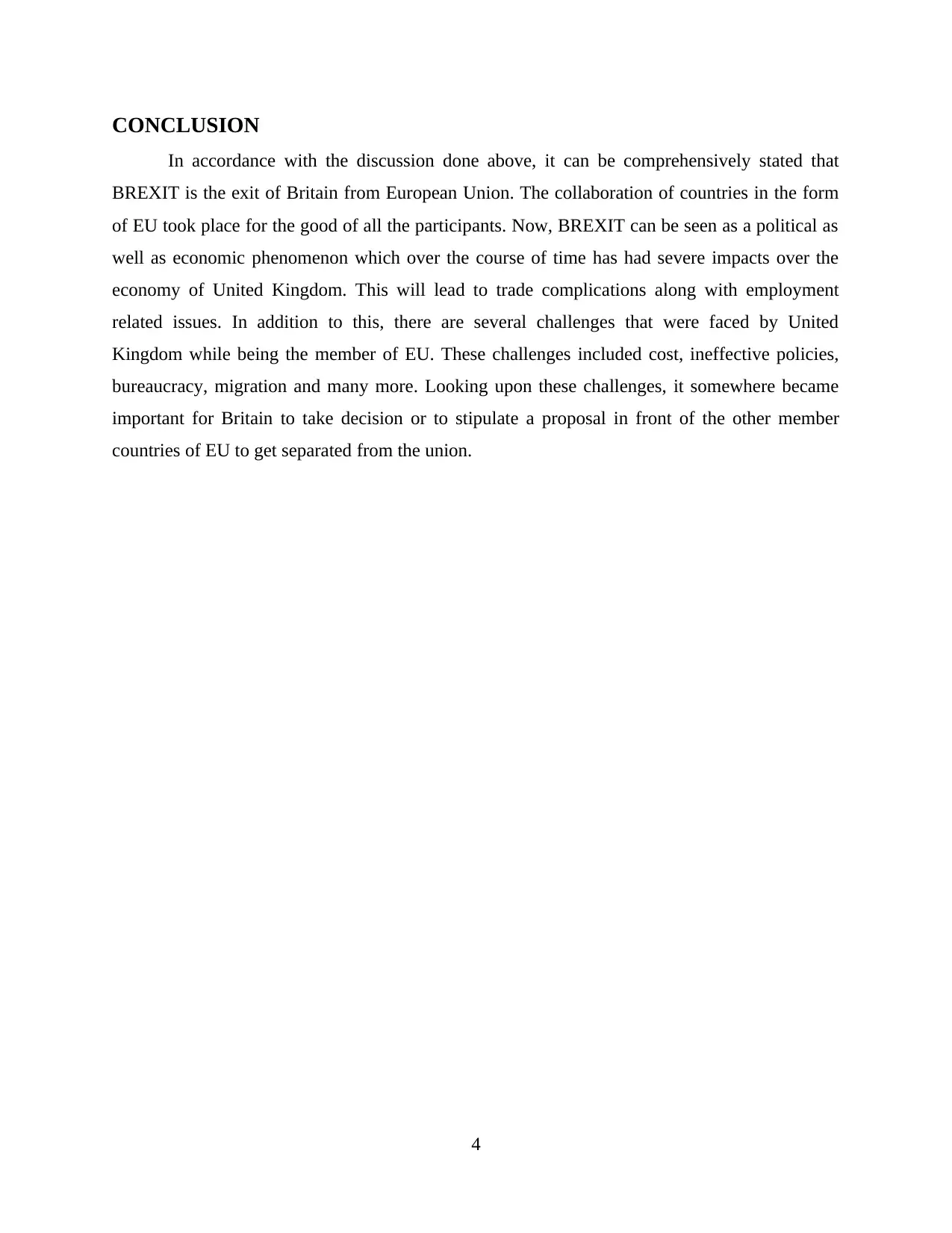
CONCLUSION
In accordance with the discussion done above, it can be comprehensively stated that
BREXIT is the exit of Britain from European Union. The collaboration of countries in the form
of EU took place for the good of all the participants. Now, BREXIT can be seen as a political as
well as economic phenomenon which over the course of time has had severe impacts over the
economy of United Kingdom. This will lead to trade complications along with employment
related issues. In addition to this, there are several challenges that were faced by United
Kingdom while being the member of EU. These challenges included cost, ineffective policies,
bureaucracy, migration and many more. Looking upon these challenges, it somewhere became
important for Britain to take decision or to stipulate a proposal in front of the other member
countries of EU to get separated from the union.
4
In accordance with the discussion done above, it can be comprehensively stated that
BREXIT is the exit of Britain from European Union. The collaboration of countries in the form
of EU took place for the good of all the participants. Now, BREXIT can be seen as a political as
well as economic phenomenon which over the course of time has had severe impacts over the
economy of United Kingdom. This will lead to trade complications along with employment
related issues. In addition to this, there are several challenges that were faced by United
Kingdom while being the member of EU. These challenges included cost, ineffective policies,
bureaucracy, migration and many more. Looking upon these challenges, it somewhere became
important for Britain to take decision or to stipulate a proposal in front of the other member
countries of EU to get separated from the union.
4
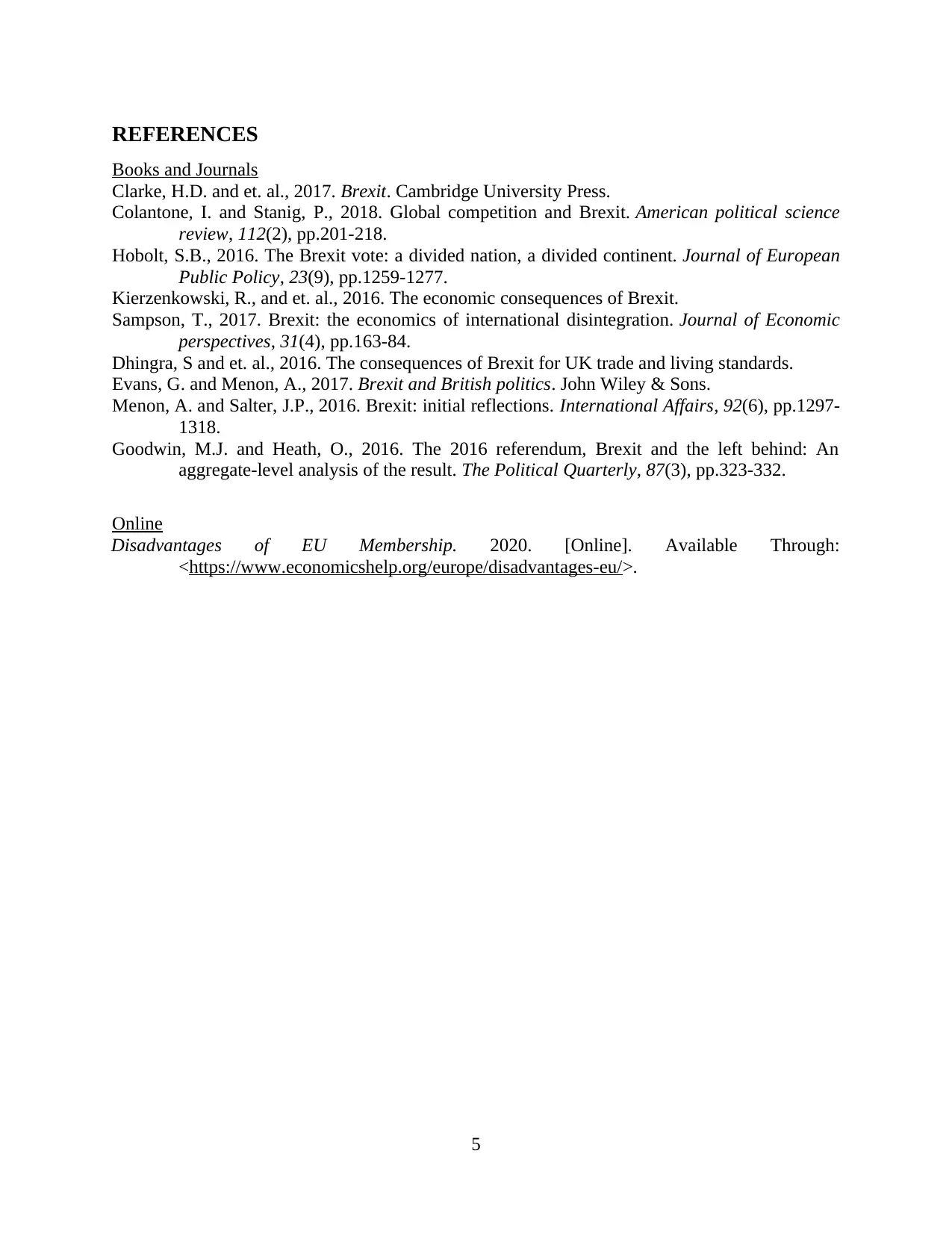
REFERENCES
Books and Journals
Clarke, H.D. and et. al., 2017. Brexit. Cambridge University Press.
Colantone, I. and Stanig, P., 2018. Global competition and Brexit. American political science
review, 112(2), pp.201-218.
Hobolt, S.B., 2016. The Brexit vote: a divided nation, a divided continent. Journal of European
Public Policy, 23(9), pp.1259-1277.
Kierzenkowski, R., and et. al., 2016. The economic consequences of Brexit.
Sampson, T., 2017. Brexit: the economics of international disintegration. Journal of Economic
perspectives, 31(4), pp.163-84.
Dhingra, S and et. al., 2016. The consequences of Brexit for UK trade and living standards.
Evans, G. and Menon, A., 2017. Brexit and British politics. John Wiley & Sons.
Menon, A. and Salter, J.P., 2016. Brexit: initial reflections. International Affairs, 92(6), pp.1297-
1318.
Goodwin, M.J. and Heath, O., 2016. The 2016 referendum, Brexit and the left behind: An
aggregate‐level analysis of the result. The Political Quarterly, 87(3), pp.323-332.
Online
Disadvantages of EU Membership. 2020. [Online]. Available Through:
<https://www.economicshelp.org/europe/disadvantages-eu/>.
5
Books and Journals
Clarke, H.D. and et. al., 2017. Brexit. Cambridge University Press.
Colantone, I. and Stanig, P., 2018. Global competition and Brexit. American political science
review, 112(2), pp.201-218.
Hobolt, S.B., 2016. The Brexit vote: a divided nation, a divided continent. Journal of European
Public Policy, 23(9), pp.1259-1277.
Kierzenkowski, R., and et. al., 2016. The economic consequences of Brexit.
Sampson, T., 2017. Brexit: the economics of international disintegration. Journal of Economic
perspectives, 31(4), pp.163-84.
Dhingra, S and et. al., 2016. The consequences of Brexit for UK trade and living standards.
Evans, G. and Menon, A., 2017. Brexit and British politics. John Wiley & Sons.
Menon, A. and Salter, J.P., 2016. Brexit: initial reflections. International Affairs, 92(6), pp.1297-
1318.
Goodwin, M.J. and Heath, O., 2016. The 2016 referendum, Brexit and the left behind: An
aggregate‐level analysis of the result. The Political Quarterly, 87(3), pp.323-332.
Online
Disadvantages of EU Membership. 2020. [Online]. Available Through:
<https://www.economicshelp.org/europe/disadvantages-eu/>.
5
1 out of 6
Related Documents
Your All-in-One AI-Powered Toolkit for Academic Success.
+13062052269
info@desklib.com
Available 24*7 on WhatsApp / Email
![[object Object]](/_next/static/media/star-bottom.7253800d.svg)
Unlock your academic potential
© 2024 | Zucol Services PVT LTD | All rights reserved.





